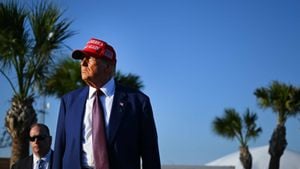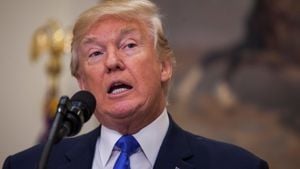After the recent election, President Donald Trump moved swiftly to organize his cabinet for the anticipated second term, choosing Scott Bessent as his Secretary of the Treasury. Bessent, not just any financial wizard, brings with him more than just experience; he has the backing of significant investment know-how and a reputation for both pragmatic and innovative thinking. This nomination marks Trump's first significant appointment for the Treasury Department, which has been under scrutiny for how it addresses the mounting issues facing the U.S. economy.
Bessent is notable not only for his credentials—having worked with legendary financier George Soros but also for being viewed as more moderate compared to some of Trump's previous picks. "Scott is widely respected as one of the world’s foremost international investors and geopolitical and economic strategists," Trump proclaimed on his platform. This sentiment has been echoed across business sectors, with executives and analysts welcoming Bessent's presence as something of a stabilizing force.
The role of Treasury Secretary is particularly consequential today. With responsibilities including supervision over tax policy and public debt, Bessent will play a pivotal role as the new administration attempts to navigate complex economic waters, continuing the focus on America’s competitiveness and addressing the ever-troubling trade imbalances. Bessent's plans include extending the tax cuts initiated during Trump’s first term and utilizing tariffs strategically as negotiating tools., both controversial and necessary aspects of the policy proposals.
The financial industry has reacted cautiously optimistic to Bessent’s nomination. Bank stocks experienced immediate positive shifts, signaling investor confidence about potential deregulation. Notably, Wells Fargo’s managing director Mike Mayo has spoken about how reducing bureaucracy can lead to improved banking efficiency—an idea Bessent apparently aligns with. CEOs, particularly those from banking giants like JPMorgan Chase, express growing faith, labeling Bessent as capable of modernizing financial policies without jeopardizing the stability achieved post-Great Recession.
Yet, challenges loom large. Some economists warn about the potential pitfalls associated with deregulation and income taxes. Critics voiced concern over possible inflationary pressures stemming from reducing controls on lending and banking practices. The Democrats have begun sounding alarms, arguing such moves could rekindle fiscal chaos reminiscent of past economic downturns. With this weighty background, Bessent may need to tread carefully to balance ambitious economic policies with the reality of governing.
Scott Bessent isn’t new to the high-stakes financial world. After making his name at Soros Fund Management, he founded Key Square Capital Management. Despite facing significant challenges—most recently, reports suggested his fund saw catastrophic losses—his return to the forefront of economic strategy under Trump suggests resilience and a renewed opportunity to revamp U.S. financial structures.
Bessent’s economic vision does not merely embrace traditional monetary theory but introduces the concept of reinvigorated tax policies aimed at fostering growth through enhanced energy production and employment directives. He famously pitched his “3-3-3” plan: lowering the federal budget deficit to 3% of GDP, securing 3% growth rates, and aiming for energy production increases. These points aim to provide reshaped fiscal oversight coupled with innovative economic tactics.
This nomination could prompt heightened debates over what the future holds for U.S. financial reform. Should Bessent’s confirmation proceed as expected, he will likely immediately direct discussions concerning the renewal of tax cuts, which if not addressed, could lead to unprecedented tax increases. For Bessent, threading the needle between facilitating business growth and maintaining economic safety assures to be one of his hardest tasks.
On the political front, insiders speculate whether Bessent's moderate approach can pull back on some of Trump’s more contentious economic promises. Speculation surrounds not just tariffs, but how international relations could shift under the backdrop of Bessent’s leadership. Those who categorize his stance as conservative to pro-business hope it will lead to cooperation, even among traditionally divergent interests.
Bessent's confirmation could draw fire from more progressive factions who are wary but wary of his affiliation with Trump's broader “America First” economic policy. Critics like Larry Summers argue the risk of renewed inflation looms if these adjustments are mishandled. The crux of the argument rests on whether ambitious tax cuts and aggressive tariffs can coexist with sustainable economic growth.
The crux of the Bessent nomination story exemplifies broader questions around the direction of U.S. financial policy. How well he navigates the path laid out by Trump, amid strong pressures from both Congressional Democrats and Republicans, could potentially alter the financial fabric of America for years to come. Will Bessent gather support to push through the necessary changes, or will he find himself at odds with the very policies he's been tasked to manage? The coming months will prove pivotal.
With ramifications across banks, markets, and everyday Americans, Bessent's stewardship over the Treasury will draw close scrutiny, not just for the measures he initiates but also for how he moderates or escalates the administration's fiscal objectives. Amid uncertainty, can he craft policies geared not only toward growth but also toward sustainability within the fabric of U.S. governance?
Time will tell if Scott Bessent can live up to the lofty expectations set before him as he aims to lead the charge toward what many hope will be renewed economic vitality for America. His appointment might signal not just change within the administration but prompt broader dialogues about the future of financial governance, the precarious balance between innovation, and regulation, and how best to safeguard the nation’s economic interests.



